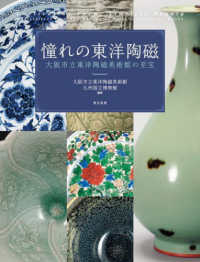- ホーム
- > 洋書
- > 英文書
- > Business / Economics
基本説明
It looks at the way material of objects and artefacts are conceived in organizations, and how they function on interaction with human agents.
Full Description
Although human lives towards the second half of the twentieth century became increasingly mediated by objects and artifacts and have depended heavily on the functioning of technical systems, materiality in a broad sense became relatively marginalized as a topic of research interest. This volume contributes to redressing the balance by drawing together the work of scholars involved in exploring the sociomaterial dimensions of organizational life. It will look at the way material objects and artifacts are conceived in organizations, and how they function in interaction with human agents.
The book offers a new conceptual repertoire and vocabulary that allows deeper thought and discussion about the inherent entanglement of the social and material. Like the preceding volumes in the Perspectives on Process Organization Studies series, the book displays the richness that characterizes process thinking, and combines philosophical reflections with novel conceptual perspectives and insightful empirical analyses.
Contents
1. Introducing the Third Volume of Perspectives on Organization Studies ; 2. Ma(R)King Time: Material Entanglements and Re-Memberings: Cutting Together-Apart ; 3. Reflections on Sociomateriality and Dialogicality in Organization Studies: from Inter-' to Intra-Thinking ... in Performing Practices ; 4. Materializing the Immaterial: Relational Movements in a Perfume s Becoming ; 5. Media as Material: Information Representations as Material Foundations for Organizational Practice ; 6. Knowledge Eclipse: Producing Sociomaterial Reconfigurations in the Hospitality Sector ; 7. The Emergence of Materiality within Formal Organizations ; 8. Reclaiming Things: An Archaeology of Matter ; 9. Untangling Sociomateriality ; 10. Doing By Inventing the Way of Doing: Formativeness as the Linkage of Meaning and Matter ; 11. Otherness and the Letting-be of Becoming: Or, Ethics Beyond Bifurcation





